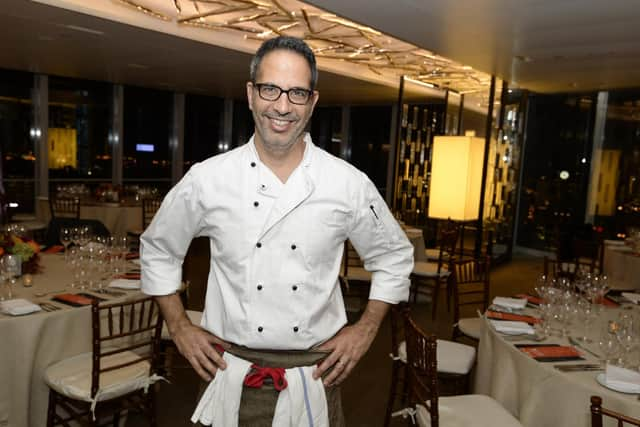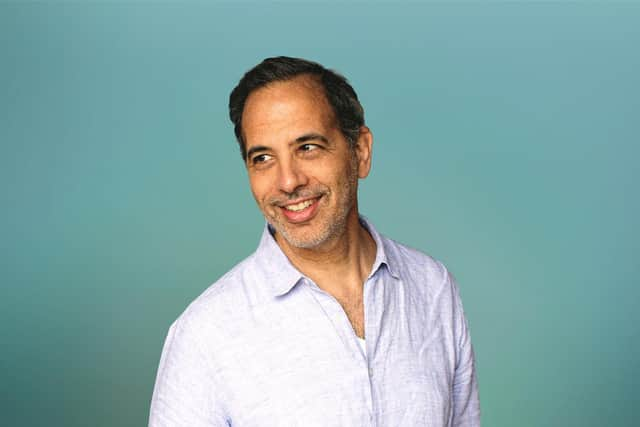Find out why Yotam Ottolenghi - the philosopher of the kitchen - is heading to Leeds
Yotam Ottolenghi is widely loved for his beautiful, inspirational, and award-winning middle eastern flavoured cookbooks, often showcasing vegetables, yet he had an unlikely beginning.
In 1997, he completed a combined bachelor’s and master’s degree in comparative literature at Tel Aviv University; his thesis was on the philosophy of the photographic image.
Advertisement
Hide AdAdvertisement
Hide AdThat same year, he moved to Amsterdam, where he worked at a Dutch-Jewish weekly newspaper and considered getting his doctorate at Yale.


Instead, and against the advice of his father, family and friends, he moved to London to study French cooking at Le Cordon Bleu.
“I have always loved cooking and I thought it would be a good idea to see if this is what I wanted to do for a living,” he explains.
“I took some courses in cookery and baking and in the late nineties and early 2000s I started working in restaurants in London. I loved it – I loved every aspect of cooking. From the actual skill of cooking, to actually feeding people – I loved to see people happy. I just fell in love with food.”
Eventually Ottolonghi met the Palestinian chef Sami Tamimi.


Advertisement
Hide AdAdvertisement
Hide AdThe pair discovered they had grown up just a few miles apart on opposite sides of the Israeli–Palestinian conflict, in Jerusalem. They became friends and eventual business partners, bonding over shared language and a joint “incomprehension of traditional English food”.
In 2002, the duo (in collaboration with Noam Bar) founded the eponymous delicatessen Ottolenghi in the Notting Hill district of London. The deli quickly gained a cult following due to its inventive dishes, characterised by the foregrounding of vegetables, unorthodox flavour combinations, and the abundance of Middle Eastern ingredients
But there wasn’t a huge ethical reasoning behind the abundance of vegetarian dishes which was still something of a novelty 20 years ago.
“We had an emphasis on vegetables as much from a practical reason than anything else.,” he explains.
Advertisement
Hide AdAdvertisement
Hide Ad“In a deli it is so much easier to display that sort of food and it looks good even if you have served some of it. You can’t say the same for fish and meat dishes. It wasn’t really about an idea. It just grew really from the flavours we loved. We never really imagined that 20 years on we’d be where we are today, you just do your thing. I am amazed every day that people still want to buy my books and eat my food.”
The Ottolenghi brand has since expanded to include two more delis (in Kensington and Belgravia), a formal restaurant in Islington, a brasserie named NOPI in Soho, and a vegetable-centric restaurant named Rovi which opened in Fitzrovia in June 2018.
In 2006 he was approached to write a recipe column for The Guardian and two years later his first cookery book, Ottolenghi, co-authored with Tamimi, was published.
“I love passing on my ideas and recipes,” says the father of two who has been married for ten years to husband Karl Allen.
Advertisement
Hide AdAdvertisement
Hide AdEight more internationally bestselling volumes have followed: a collection of recipes exploring the flavours of his home-city, Jerusalem with Tamimi (2012); the vegetable cookbooks Plenty (2010) and Plenty More (2014); a cookbook from his acclaimed London restaurant, Nopi (2015); a dessert cookbook, Sweet (2017); Ottolenghi Simple (2018); and Ottolenghi Flavor (co-written with Ixta Belfrage).
His books have sold more than five million worldwide.
When he is not cooking, he oversees the day-to-day running of his business and makes occasional television programs. Family life with his husband and two young sons and Pilates are much-loved distractions.
With more than 300 employees the pandemic has been tough for Ottolenghi.
“I was really worried about whether we would be able to survive,” he admits. “It wasn’t clear at all that the restaurants would be safe. When you employ 300 people that is a lot of livelihoods you are responsible for. It was terrifying.”
Advertisement
Hide AdAdvertisement
Hide AdBut looking back, although there were a lot of tragedies, he can see positives about what happened, not just for his business but for society.
“I think we came out stronger in some fundamental way. Some people learnt how to cook and others became better cooks.”
He took the experiences people had during lockdown and the current cost of living crisis to write his most recent book Ottolenghi Test Kitchen: Shelf Love with Noor Murad and his next book, also with Noor Murad, will be Ottolenghi Test Kitchen: Extra Good Things (Penguin Random House, October 18, 2022).
“It has become extremely expensive for people to cook properly. But in some ways the pandemic and difficulty with the supply chain is a more sustainable way of living. We have taken it for granted that we can have what we want when we want it and that really isn’t sustainable,” he says.
Advertisement
Hide AdAdvertisement
Hide Ad“I really don’t take things for granted any more. Something was bound to happen – it has been boiling up for a long time. It goes back to post World War Two. The gap between what we eat and how it is produced has been growing and growing and at some point something had to give.
For Yotam Ottolenghi, food is about more than what we eat. It is about joy, pleasure, and surprise. It is about a sense of place and home. It is about commonality, an act which brings people together.
“It’s tragic that we are so good at adapting ourselves to different cuisines and enjoy being super international, yet we are not able to apply the same level of tolerance to the actual people that cook them.” Simply put, this philosopher of the kitchen is passionate about making people happy through food and not just by putting it on our plates..
He is often asked to speak at events and explore the power of food and its cultures. He will be a guest speaker at the Leeds International Festival of Ideas in September.
Advertisement
Hide AdAdvertisement
Hide Ad“I never just talk about food,” he says, “I am more interested in talking about the culture of food, what happens when two people meet over a meal and the power of food to unite , that sort of context fascinates me.”
Leeds International Festival of Ideas is back in September, this time four days of conversation, connection and curiosity. Speakers include Yotam Ottolenghi, Aisling Bea David Olusoga and Mary Beard. The festival takes place between September 22 and 25 at the Howard Assembly Room
https://leedsinternationalfestival.com/